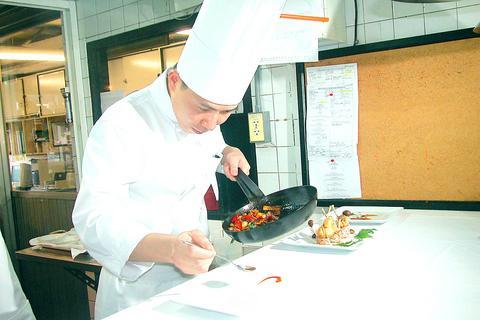Taiwan is well-known for delicacies and cooking spectacles, but to fully experience these one should go to the Taipei Chinese Culinary Exhibition (台北中華美食展, TCCE), which started yesterday and will go on until Sunday, in Area A, at the main hall in the Taipei World Trade Center.
This is the exhibition's 15th year and the organizers expect more than 150,000 people to visit. Over 3,000 tourists from overseas have registered to attend the cooking classes given by star chefs.

PHOTOS COURTESY OF TCCE
Apart from cooking classes, featured cuisine exhibitions and culinary arts performances, there will be an international cooking competition.
Health-oriented foods is one theme of the TCCE this year. The exhibition will feature 96 Chinese, Western and Japanese dishes, including green bamboo shoots with lamb chops, sea bass with papaya salsa and papaya salad with caviar and scallops. As for the mango dishes, at least 40 mango dishes will be presented each day.
Eight teams are entered for The International Cooking Competition, including Malaysia, Hong Kong, Singapore, South Korea, Japan, and Beijing, as well as two teams from Taiwan.
Competitors are all battle-hardened contest veterans with world-class skills. The Hong Kong team is led by the famous East Ocean Seafood Restaurant Group (東海海都). The Beijing team is formed by chefs from the Grant Hyatt Beijing. The South Korean team is represented by the five-star Shilla Hotel. Malaysia and Singapore has teams from major hotels.
The two Taiwan teams, selected from 11 contenders in pre-competition events, are formed from chefs of the Pause Landis Hot Spring Hotel (璞石麗緻溫泉會館) and professors of the Kaohsiung Hospitality College (高雄餐旅學院).
The excitement of the competition will reach a peak during the final round on Sunday. The competing teams will be required to make dishes within a set time limit using pre-designated ingredients, ensuring a challenging and exciting contest.

The primaries for this year’s nine-in-one local elections in November began early in this election cycle, starting last autumn. The local press has been full of tales of intrigue, betrayal, infighting and drama going back to the summer of 2024. This is not widely covered in the English-language press, and the nine-in-one elections are not well understood. The nine-in-one elections refer to the nine levels of local governments that go to the ballot, from the neighborhood and village borough chief level on up to the city mayor and county commissioner level. The main focus is on the 22 special municipality

The People’s Republic of China (PRC) invaded Vietnam in 1979, following a year of increasingly tense relations between the two states. Beijing viewed Vietnam’s close relations with Soviet Russia as a threat. One of the pretexts it used was the alleged mistreatment of the ethnic Chinese in Vietnam. Tension between the ethnic Chinese and governments in Vietnam had been ongoing for decades. The French used to play off the Vietnamese against the Chinese as a divide-and-rule strategy. The Saigon government in 1956 compelled all Vietnam-born Chinese to adopt Vietnamese citizenship. It also banned them from 11 trades they had previously

Jan. 12 to Jan. 18 At the start of an Indigenous heritage tour of Beitou District (北投) in Taipei, I was handed a sheet of paper titled Ritual Song for the Various Peoples of Tamsui (淡水各社祭祀歌). The lyrics were in Chinese with no literal meaning, accompanied by romanized pronunciation that sounded closer to Hoklo (commonly known as Taiwanese) than any Indigenous language. The translation explained that the song offered food and drink to one’s ancestors and wished for a bountiful harvest and deer hunting season. The program moved through sites related to the Ketagalan, a collective term for the

As devices from toys to cars get smarter, gadget makers are grappling with a shortage of memory needed for them to work. Dwindling supplies and soaring costs of Dynamic Random Access Memory (DRAM) that provides space for computers, smartphones and game consoles to run applications or multitask was a hot topic behind the scenes at the annual gadget extravaganza in Las Vegas. Once cheap and plentiful, DRAM — along with memory chips to simply store data — are in short supply because of the demand spikes from AI in everything from data centers to wearable devices. Samsung Electronics last week put out word